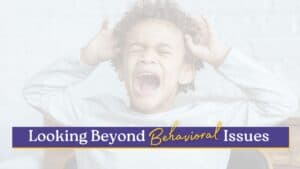
Looking Beyond Behavioral Issues
Behavioral issues can be incredibly consuming and overwhelming, to say the least! In working with families, I always remind parents that they are not alone in facing these difficulties. These

Practical ways to navigate the changes in your marriage
When Dr. Greg and Erin Smalley learned they were pregnant with their first child, they weren’t expecting to start a family for another five years. Though the birth of their daughter radically changed the couple’s immediate plans for the future, “This pregnancy was not unknown to God,” Erin says.
In addition to having to change their immediate plans – which included calling off a study abroad opportunity in England – the couple says they also experienced a shift in their relationship. Greg, author and now vice president of Family Ministries at Focus on the Family, and Erin, a counselor and former labor and delivery nurse, identify three areas where expectant couples may experience changes in their relationship:
Communication. When a baby is on the way, a couple’s conversation can become all about the baby. “You’re preparing your home and relationship for this baby to join your family,” Erin says. “Of course you’re going to talk about it!”
This kind of conversation is healthy and natural, but couples should also be sensitive to what their partner needs.
“There’s something amazing about dreaming about parenthood together and deciding on names and thinking about who this child will be,” Greg says. “But your spouse may also want to talk about other interests.”
While it’s important to remain sensitive to the needs of your spouse, you clearly will not be eliminating conversation about the baby altogether.
As your topics of conversation expand to stroller brands and cloth or disposable, just make sure you’re engaging your spouse in conversation that makes him or her feel loved and valued.
Greg says listening – especially on the part of the guy – is key to good communication during pregnancy. Along with sensitivity, Greg suggests, “Men like to communicate when there’s a problem to solve,” he says. “When hormones are raging and it’s hard to know if her feelings are rational, the worst thing I can do is debate whether her feeling is right or wrong. I’m going to be a listener.”
Care. Pregnancy is a season when tenderness between partners can expand exponentially.
Not long ago, I was at the gym working out on an elliptical machine. A few minutes into my workout, a woman stepped onto the machine next to me, and not long after that, her husband came and stood next to her. He lingered there for the remaining 20 minutes of her workout, which I found a little strange.
Only after she finished did I notice the telling “bump” protruding from her middle and the signature pregnancy swagger as her husband accompanied her – his hand on the small of her back – to the water cooler. I smiled, remembering how attentive and protective my husband was during my pregnancies.
“Our perspective of each other changed,” Greg says, recalling Erin’s first pregnancy. “You find a new variation of your love for each other. I remember looking at Erin and watching her belly grow and thinking, She’s carrying my child. Wow. I gained a new level of appreciation for who she was. There’s an amazing beauty to your wife when she’s pregnant with your child.”
Conflict. It would be great if every relational change during the journey of pregnancy was a positive one, but new relationship difficulties can surface.
“Whether this baby will bring spouses closer together or drive them apart has everything to do with the pre-baby relationship,” Greg says. “Having a child is going to intensify everything in the relationship. The good will be even better, but the bad will be magnified by 1,000 percent. When you factor in sleep deprivation, the hormones, the exhaustion, even tiny things spark. What may have been a small disagreement before can turn into a major issue.”
Erin adds, “The couple may be dealing with some new frustrations with each other. There are a lot of women who assume that their husband should know about and be meeting these new needs.”
The Smalleys suggest that couples seek counseling for any significant issues that arise. “Shore up your relationship before the baby comes,” Greg says. “How are you handling stress? How are you dealing with conflict? If there are any past issues you haven’t dealt with, deal with them now.”
In addition, he advises, “Keep short accounts. When conflict happens, give each other space, the benefit of the doubt and grace. Be quick to offer forgiveness.”